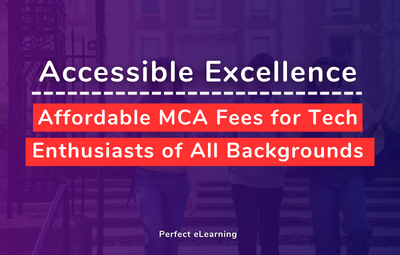

In today's competitive job market, having an MBA degree can provide a significant advantage. However, pursuing a traditional MBA program can be time-consuming, often taking two years or more to complete. This is where accelerated MBA programs come into play. These intensive programs are designed to condense the curriculum and allow students to earn their MBA degree in a shorter period.
What are Accelerated MBA Programs?
Accelerated MBA programs are specialized programs that enable students to earn their MBA degree in a shorter timeframe compared to traditional programs. These programs typically compress the coursework and eliminate breaks between semesters, allowing students to complete their studies in as little as 12 to 18 months.
Benefits of Accelerated MBA Programs
1. Time Efficiency: The primary benefit of accelerated MBA programs is the time saved. By completing the program in a shorter duration, you can quickly gain the knowledge and credentials needed for career advancement.
2. Cost Savings: Since accelerated programs require less time, you can save on tuition fees and other expenses associated with an extended program.
3. Intensive Learning Experience: Accelerated MBA programs offer a rigorous and immersive learning environment, providing a concentrated dose of knowledge and skills.
4. Networking Opportunities: These programs attract ambitious professionals from various industries, allowing you to build a strong network of like-minded individuals.
How Do Accelerated MBA Programs Work?
Accelerated MBA programs follow a structured and condensed curriculum. The coursework covers essential business topics such as finance, marketing, operations, strategy, and leadership. The program may include group projects, case studies, and real-world simulations to enhance practical skills.
To accommodate the accelerated format, classes are often held during evenings, weekends, or in intensive blocks. This allows working professionals to pursue the program without compromising their job commitments.
Admission Requirements for Accelerated MBA Programs
1. Bachelor's Degree: Most programs require applicants to have a bachelor's degree from an accredited institution.
2. Work Experience: While some programs accept recent graduates, many prefer candidates with relevant work experience to contribute to class discussions and projects.
3. Standardized Tests: Many programs require applicants to submit GMAT or GRE scores, although some may waive these requirements based on work experience or academic performance.
4. Letters of Recommendation: Applicants are typically required to submit letters of recommendation that speak to their qualifications and potential for success in the program.
5. Statement of Purpose: A statement of purpose or personal essay allows applicants to showcase their motivation, goals, and how the program aligns with their career aspirations.
Top Accelerated MBA Programs
1. Harvard Business School (United States)
2. INSEAD (France/Singapore)
3. London Business School (United Kingdom)
4. MIT Sloan School of Management (United States)
5. IE Business School (Spain)
Choosing the Right Accelerated MBA Program
1. Curriculum: Review the course offerings and ensure they align with your career goals and interests.
2. Faculty: Research the qualifications and expertise of the faculty members to ensure they have relevant industry experience.
3. Accreditation: Verify that the program and institution are accredited by recognized accrediting bodies.
4. Career Services: Investigate the resources available for career support, internships, and job placement.
5. Alumni Network: Look into the strength and reach of the program's alumni network, as it can be valuable for future networking and career opportunities.
Challenges of Accelerated MBA Programs
1. Intensive Workload: The condensed format requires students to handle a significant amount of coursework and assignments within a limited time frame.
2. Limited Breaks: Accelerated programs often have shorter breaks between semesters or no breaks at all, making it crucial to manage time effectively.
3. Less Flexibility: The accelerated format may offer limited options for electives or specialized tracks compared to traditional MBA programs.
4. Work-Life Balance: Balancing the demands of an accelerated program with work and personal commitments can be demanding and require careful planning and prioritization.
Success Stories: Real-Life Experiences
1. Sarah Patel: Sarah enrolled in an accelerated MBA program while working full-time as a marketing manager. Upon completing the program, she was promoted to a senior leadership position within her company.
2. David Lee: David, a software engineer, decided to pursue an accelerated MBA to gain business knowledge. With his technical expertise combined with the MBA, he successfully transitioned into a product management role in a leading technology company.
3. Jennifer Thompson: Jennifer, an entrepreneur, joined an accelerated MBA program to refine her business skills. After graduation, she used the knowledge gained to launch her own successful startup.
Networking Opportunities in Accelerated MBA Programs
One of the significant advantages of accelerated MBA programs is the opportunity to network with professionals from diverse backgrounds. Networking events, group projects, and collaborative learning environments facilitate connections that can lead to valuable relationships and future business opportunities.
Career Advancement with an Accelerated MBA
Completing an accelerated MBA program can significantly enhance your career prospects. The program equips you with essential business skills, leadership abilities, and a strong professional network. These assets can open doors to promotions, higher salaries, and increased responsibilities within your current organization or new job opportunities.
Return on Investment (ROI) for Accelerated MBA Programs
Accelerated MBA programs are a substantial investment of both time and money. However, when considering the return on investment, factors such as career advancement, salary increases, and expanded professional networks should be taken into account. Many graduates of accelerated MBA programs have reported a positive ROI in terms of career growth and earning potential.
Is an Accelerated MBA Program Right for You?
1. Time Commitment: Are you willing to commit to an intensive and demanding program that may require sacrifices in other areas of your life?
2. Learning Style: Are you comfortable with a fast-paced and condensed learning environment?
3. Work Experience: Do you have sufficient work experience to contribute to class discussions and benefit from the program's emphasis on real-world applications?
4. Career Goals: Will an accelerated MBA align with your career goals and help you achieve the desired level of professional growth?
Conclusion
Accelerated MBA programs offer a time-efficient and intense learning experience for individuals seeking to earn their MBA degree promptly. These programs provide numerous benefits, including time savings, cost efficiency, and intensive networking opportunities. By carefully considering the admission requirements, researching top programs, and evaluating personal readiness, you can make an informed decision about pursuing an accelerated MBA.
FAQs (Frequently Asked Questions)
Q: Can I work while pursuing an accelerated MBA?
A: Yes, many accelerated MBA programs are designed to accommodate working professionals. The classes are often scheduled in the evenings, weekends, or intensive blocks, allowing you to balance work and studies.
Q: How long does it take to complete an accelerated MBA program?
A: The duration of accelerated MBA programs varies, but most can be completed in 12 to 18 months, depending on the program structure and requirements.
Q: Will an accelerated MBA program provide the same quality education as a traditional program?
A: Accelerated MBA programs are designed to maintain the same level of academic rigor and quality as traditional programs. However, it's essential to research and choose accredited institutions with a solid reputation for delivering high-quality education.
Q: Are accelerated MBA programs more expensive?
A: Accelerated MBA programs may appear more expensive due to the condensed timeframe. However, when considering the reduced opportunity cost of completing the program sooner and the potential for salary increases and career advancement, the overall return on investment can be substantial.


